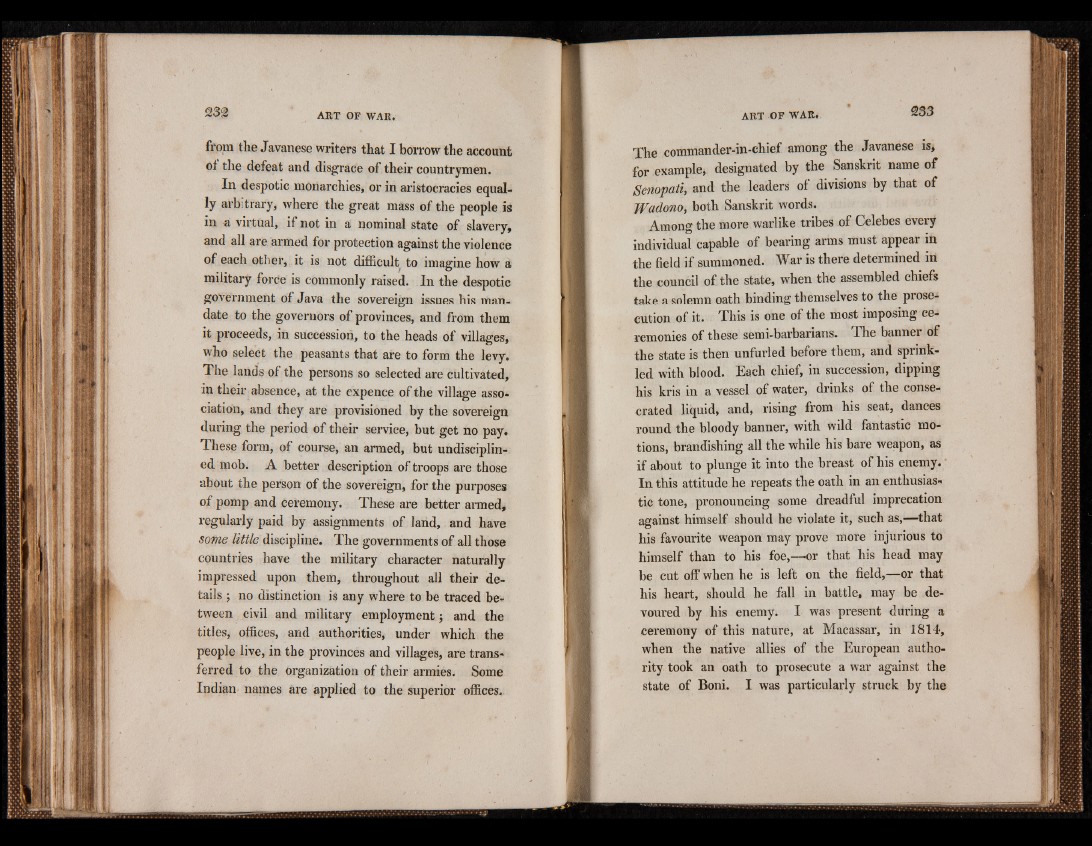
from the Javanese writers that I borrow the account
of the defeat and disgrace of their countrymen.
In despotic monarchies, or in aristocracies equally
arbitrary, where the great mass of the people is
in a virtual, if not in a nominal state of slavery,
and all are armed for protection against the violence
of each other, it is not difficult to imagine how a
military force is commonly raised. In the despotic
government of Java the sovereign issues his mandate
to the governors of provinces, and from them
it proceeds, in succession, to the heads of villages,
who select the peasants that are to form the levy.
The lands of the persons so selected are cultivated,
in their absence, at the expence of the village association,
and they are provisioned by the sovereign
during the period of their service, but get no pay.
These form, of course, an armed, but undisciplined
mob. A better description of troops are those
about the person of the sovereign, for the purposes
of pomp and ceremony. These are better armed,
regularly paid by assignments of land, and have
some little discipline. The governments of all those
countries have the military character naturally
impressed upon them, throughout all their details
; no distinction is any where to be traced between
civil and military employment j and the
titles, offices, and authorities, under which the
people live, in the provinces and villages, are transferred
to the organization of their armies. Some
Indian names are applied to the superior offices.
The commander-in-chief among the Javanese is,
for example, designated by the Sanskrit name of
Senopati, and the leaders of divisions by that of
Wadono, both Sanskrit words.
Among the more warlike tribes of Celebes every
individual capable of bearing arms must appear in
the field if summoned. War is there determined in
the council of the state, when the assembled chiefs
take a solemn oath binding themselves to the prosecution
of it. This is one of the most imposing ceremonies
of these semi-barbarians. The banner of
the state is then unfurled before them, and sprinkled
with blood. Each chief, in succession, dipping
his kris in a vessel of water, drinks of the consecrated
liquid, and, rising from his seat, dances
round the bloody banner, with wild fantastic motions,
brandishing all the while his bare weapon, as
if about to plunge it into the breast of his enemy.
In this attitude he repeats the oath in an enthusiastic
tone, pronouncing some dreadful imprecation
against himself should he violate it, such as,—that
his favourite weapon may prove more injurious to
himself than to his foe,-—or that his head may
be cut off when he is left on the field,—or that
his heart, should he fall in battle, may be devoured
by his enemy. I was present during a
ceremony of this nature, at Macassar, in 1814,
when the native allies of the European authority
took an oath to prosecute a war against the
state of Boni. I was particularly struck by the